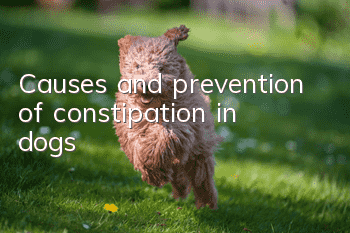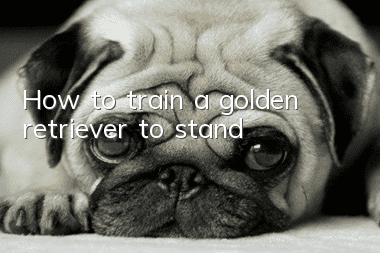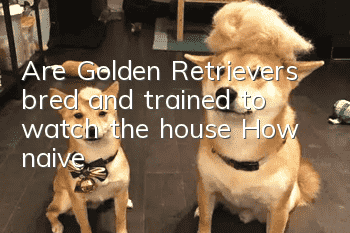Causes and prevention of constipation in dogs

Causes of dog constipation:
1. Dog food that is too dry: Dog food that is too dry and lacks moisture is very easy to cause constipation in dogs.
2. Imbalanced nutrition: Imbalanced nutrition and eating too complex foods that lack fiber can also cause constipation in dogs.
3. Sudden change of environment: Dogs are very sensitive animals to the environment, so if they are suddenly changed to a brand new environment, it will cause the dog to become uneasy and affect eating and defecation.
4. Obesity: Obesity can also cause constipation in dogs. You should pay attention to the amount of exercise your dog gets.
5. Insufficient exercise in dogs leads to weakened digestive function and long-term accumulation of food in the intestines, which can cause constipation in dogs.
6. Constipation can also occur in dogs if they are sick, such as abdominal tumors, abdominal muscle injuries, pelvic diseases, prostatic hyperplasia, rectal stenosis, anal diseases, anal cystitis, anal injuries, etc. Dogs are constipated.
7. Some dogs can also suffer from constipation due to hair problems, especially those that are prone to hair loss or long hair, such as Pomeranians. The reason is that dogs may ingest their own hair and cause constipation.
8. The dog’s feces contains a lot of water. If the dog’s daily drinking water is insufficient, the feces will be too dry, which will make it difficult to remove the water. Hard and dry feces are excreted from the body, causing constipation.
9. If your dog accidentally eats foreign objects, such as bones, paper, popcorn, hair, etc., it may cause intestinal obstruction and constipation.
Prevention and treatment of constipation in dogs:
1. Pay attention to a balanced diet
You can usually give your dog more plant fiber-rich foods The fruits and vegetables can increase the crude fiber content of dogs and promote intestinal peristalsis. Let your dog eat less meat and animal offal, and do not feed a certain brand of dog food without changing it for a long time.
2. Give your dog more water
Drinking water can not only replenish the water needed by the body, but also speed up the dog’s metabolism, promote intestinal peristalsis, and help the dog defecate. . Therefore, owners should urge their dogs to drink more water to ensure their health.
3. Walk your dog more and keep your dog plenty of exercise
Let your dog exercise more to improve his physical fitness, improve his digestion, and help and stimulate his dog's defecation. Therefore, owners can take their dogs out more and let them exercise and train more.
4. Strictly control the amount and time of food intake
By controlling the amount and time of the dog's daily food intake, reduce the number of times the dog is fed snacks and help the dog Prevent and relieve constipation. At the same time, it can also effectively control the dog's weight, prevent the dog from being too obese, and contribute to the dog's health.
5. Set a specified time and go to the toilet regularly
If your dog goes to the toilet irregularly, it can also cause constipation. At this time, the owner needs to take the dog out for a walk at a fixed time every day, and do not let the dog hold it in for too long. Regular defecation habits can also prevent constipation in dogs.
6. Feed the dog some probiotics
Constipation is mostly caused by indigestion. If the dog’s gastrointestinal function is poor, it is recommended that the owner can give it Feeding dogs some probiotics can enhance their digestion and absorption capabilities, protect their intestines and stomach, and improve their intestinal immunity.
7. If the condition is severe, use Kaiselu.
Use Kaiselu on the dog from the anus to promote the discharge of stool. Kaiselu is very miraculous and effective in lubricating and stimulating the intestines. In addition, Kaiselu is a topical medicine, so you don’t have to worry about it causing harm to your dog.
- How much do you know if your pet dog tilts its head and kills you? Be careful because it may cause a brain disease!
- What can’t Eastern Sichuan Spaniels eat?
- Can I give bread slices to my dog?
- What are the common skin diseases in dogs and how to prevent and treat them?
- Is osteomyelitis painful in dogs?
- What are the early symptoms of canine distemper? What are the treatments for canine distemper?
- If a dog has been vaccinated against rabies, does it still need to be injected if it is bitten?
- What to do if your Golden Retriever is deficient in calcium
- Will dog pee kill shrubs?
- What will happen if your dog takes too much calcium?



